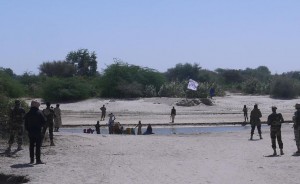A yet unknown number of Nigerian soldiers drowned in the Yobe River in North-East Nigeria as they tried to escape intense fire from Boko Haram fighters on Monday, PREMIUM TIMES can authoritatively report.
Also, no fewer than 22 soldiers are currently recuperating in a hospital in neighbouring Niger Republic following the attack.
The troops were manning an outpost in Gashigar, Borno State, near the border with Niger, when hundreds of terrorists advanced rapidly towards them, forcing the troops to abandon their position with some diving into the nearby river, top military sources familiar with the development told PREMIUM TIMES Wednesday.
The Nigerian Army had on Tuesday distributed a statement announcing the assault on Nigerian troops, but blamed it on “escaping Boko Haram remnants.”
But a day after the statement, which was signed by Sani Usman, a colonel, details of what actually transpired on the battlefield that day and the reaction of commanders on the ground have been exclusively obtained by PREMIUM TIMES.
According to the security sources, the soldiers, attached to 145 Task Force Battalion, came under attack around 5:00 p.m. on Monday, but rescue operation did not yield result until the next day.
On that Tuesday, three rescue operations were carried out by soldiers from the neighbouring Republic of Niger operating in Ngarwa.
Around 7:00 a.m., they rescued the first set of nine Nigerian soldiers. At about 2:00 p.m., seven more were rescued. The last set of six troops was rescued around 5:30 p.m. in the River Komadougou Yobe, which empties into Lake Chad through Niger.
The troops, numbering 22, were dispatched to Diffa General Hospital in Niger. Two of them sustained gunshot wounds while the rest were said to have been rescued unscathed.
The casualty figure, including those who drowned, was yet to be determined as at the time of filing this report.
The sources said the troops have started recounting the incident to their superiors.
The soldiers said they were manning their post in Gashigar when they learnt that suspected terrorists, dressed in black and multi-coloured camouflage, were approaching in several utility trucks while chanting ‘Allah Akbar!’ (Allah is great).
“Troops then had to flee from their position because of their their inability to take on the terrorists in such a large number and firepower,” one of our sources said.
“The terrorists then began chasing them, and we learnt that many jumped into the Yobe River where some of them drown or get fatally shot by the attackers.”
The soldiers also said Boko Haram seized their armoured vehicle and set it alight.
But the sources said the military leadership might open an investigation into the attacks to establish the claims of the soldiers.
One source said some of the claims made by the troops were doubtful.
For instance, the commanders said it is difficult to explain how utility trucks were used to dispossess soldiers of their armoured vehicles especially when the soldiers said they were standing alert in their position.
The leadership also found it curious that the soldiers were rescued with their bullets still largely unspent.
“If they actually came under attack while they were fully at alert, then they should have exhausted their ammunition before taking to their heels,” the source said. “At least that much should be clear.”
Mr. Usman did not respond to PREMIUM TIMES’ requests for comments.
Nigerian troops are fighting alongside their counterparts from Cameroon and the Republic of Niger.
Monday’s development marked the first time in more than two years that Nigerian troops would come under superior firepower that required foreign military personnel to come to counter.
A similar incident last occurred in August 2014 when about 480 troops crossed the border into Cameroon while fleeing Boko Haram.
It also underscored the renewed vigour of the sect to launch major attacks on not just civilians but uniformed men after losing the huge swathes of land it once controlled.
Besides losing territory, the insurgents had also been largely decimated by the troops which experts said is responsible for their activities being whittled down across their stronghold in the northeast.
The insurgency, which began in 2009, has left approximately 20,000 people dead and displacement of millions.
Boko Haram leaders recently engaged in negotiation with the Nigerian government which led to last week’s release of 21 of the over 200 girls kidnapped from Chibok, Borno State, in April 2014.
premiumtimesng.com



